Core of Wu's Teaching
You can hear Wu speaking to the hearts of students of Chan. Or, you can hear him give one of his humorous yet powerful talks in the world's lecture halls, his words penetrating the hearts of audiences. Wu is a wise patriarch who provides people with guidance on their journey through life and helps them find its fundamental meaning in order to reach their true nature. As a religious teacher, Wu stresses both the understanding and practice of Buddhist doctrine.
Huazang Mind Dharma & Holistic Life Science
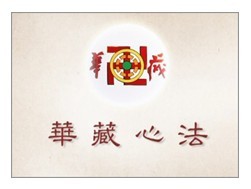
Facing human society, there are three major imbalances (三大不協調):within people themselves, between people, and between people and nature. Four large separations (四大分離) also exist within society: the material from spiritual, the guest from the host, the whole from the part, the human from the nature. Thus, Wu advocates respect for life and the promotion of the holistic life science.
On December 20, 1995, Wu delivered a lecture at the University of Science & Technology of China, for the first time exposing to the public the definition of the “Life” concept. He explained, “Anything that has experienced the process of space and time is life.” He also said that life is not limited to animals, plants and microorganisms. Wu defined life by the evolutionary law of space and time, relating the concept to the three factors of matter, energy, and information which form the key for improving the quality of life.
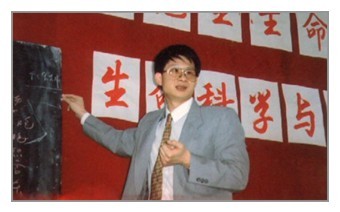 Since the 1990’s, Wu has taught theories of Huazang Mind Dharma in colleges and institutes throughout the country and helped people by treating their illnesses. While undergoing that mission, he devoted considerable time and effort establishing the theory of “Harmonious Unification” (和諧統一論) and summarizing the principles of life consciousness, perfection of character, and standardizing of actions, exhorting the people to bring benefit and prosperity to the nation by sharing her troubles and concerns and perfecting their conduct.
Since the 1990’s, Wu has taught theories of Huazang Mind Dharma in colleges and institutes throughout the country and helped people by treating their illnesses. While undergoing that mission, he devoted considerable time and effort establishing the theory of “Harmonious Unification” (和諧統一論) and summarizing the principles of life consciousness, perfection of character, and standardizing of actions, exhorting the people to bring benefit and prosperity to the nation by sharing her troubles and concerns and perfecting their conduct.
The desired effects are obvious to all, which the concerned governmental departments can verify through any Life Science Society in the country or any student of Huazang Mind Drama. Wu has been encouraging them to educate themselves, be confident, share the worries of the homeland, bring benefits to the nation and maintain peace in society.
Chan Practice - “Five Positions of Monarch and Ministries”
In 1994, Wu published an article "Discussion on Mind". In it, he taught the specific ideology that there is no difference between "Matter" and "Mind". (Download Chinese PDF of "Discussion on Mind")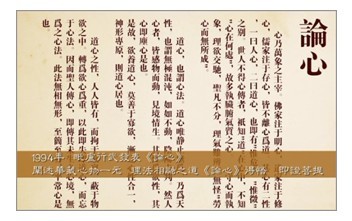
Wu guides practitioners into the world of Chan by presenting Chan in terms that modern people can easily grasp. His teachings also encourage practitioners to apply what they have learned to their daily lives; after all, Chan is about living in the moment. Because his system of thought and methods of practice make people aware of how close Chan is to their lives, practitioners of Chan can therefore provide the people of the modern world with an effective means to bring tranquility to their spirits.
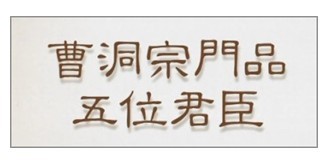 One of the focuses of Wu’s Chan teaching is on developing wisdom and emphasizing personal practice, supplemented with guidance from the Huazang Mind Dharma, the second main doctrine he promoted. With the process of "Gradual Practice, Sudden Enlightenment," a practitioner starts by training the scattered mind until the mind gradually settles down and clears to a state of one-pointed concentration, or "unified mind". Afterwards, as the practitioner's Chan practice reaches an advanced level, the emphasis would shift to "letting go" - letting go of all striving, and even letting go of the thought of letting go itself, so that emptiness may be experienced after the processes of language and thought are stilled.
One of the focuses of Wu’s Chan teaching is on developing wisdom and emphasizing personal practice, supplemented with guidance from the Huazang Mind Dharma, the second main doctrine he promoted. With the process of "Gradual Practice, Sudden Enlightenment," a practitioner starts by training the scattered mind until the mind gradually settles down and clears to a state of one-pointed concentration, or "unified mind". Afterwards, as the practitioner's Chan practice reaches an advanced level, the emphasis would shift to "letting go" - letting go of all striving, and even letting go of the thought of letting go itself, so that emptiness may be experienced after the processes of language and thought are stilled.
From July 2011, Wu, an heir to Caodong lineages of Chan, primarily guided followers to a more extensive Chan practice by presenting the most direct and refined instruction found in the “Five Positions of Monarch and Ministries” through the Caodong specialty. By moving from the simpler to the more complex approaches, Wu has created a dynamic, vital style of Chan practice that progresses from the basics of focusing on “this moment” to the have a clear and empty mind. Only then, by being between “Emptiness” and “Form,” could one achieve the goal of seeing one’s pure nature and of reaching enlightenment.
The Promotion of “Doing A Good Deed Per Day” 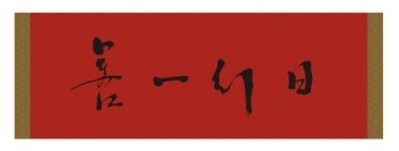
Since 2001, Wu promoted the daily activity “doing a good deed per day.” In his belief, any ordinary person doing a good deed for the day will experience growth of their virtuous foundation and wisdom sense, and will eliminate all their evils. They will be in a mood of harmony and kindness. Therefore, disputes, fights, and conflicts will decrease accordingly. Furthermore, the sense of harmony will envelop them. As a result of one’s kindness and good deeds, one’s ideological outlook and behaviors will be changed accordingly. This will cause the crowd around them to feel the kindness and goodness embodied within them. They will become a good example for others and thus eventually propel their social environment on a path toward improvement.
In addition, doing a good deed for the day can be self-redemption of one’s own sins. If anyone can and should pursue doing a good deed for the day, there is no big or small measurement applied to kindness.Therefore, everyone can perform it, regardless of their religion, belief, or social ideology.
Wu believes that if a person persists in doing this, they will eventually become self-enlightened. If a country pursues this ideology, the country will abound with peace and tranquility. If it is performed throughout the entire world, all humanity will abound with harmony!
Advocate “Fasting for Charity” 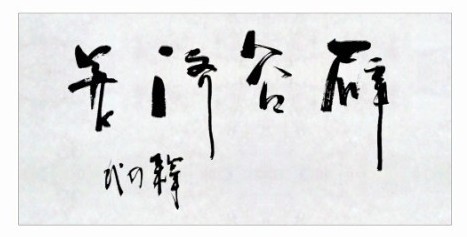
After Wu was released from prison in 2010, he offered a unique exercise concerning how to fast. Because many toxic substances are in the food we take in every day, they accumulate inside the body. This causes our Qi and our meridians to become impure. The purity of Qi and the meridians are vital to concentration while meditating. Without such purity, it is impossible to concentrate, which interferes with spiritual growth, wisdom or supernatural function. So a meditator needs to fast at least 3 days per month in order to detoxify the body and purify the Qi and meridians. This benefits concentration. If a layman can fast one day per month, his organs will be free from toxins, and he will gain good health.
Moreover fasting each 14th, 15th , 16th of each month saves money, which can then be used by Wu's students and followers to support poor children in Tibet, Xinjiang, Sichuan Province of China. Such funds can also support children who are seriously ill and need this money to pay for medical fees.
Most importantly, those people who practice fasting will find their health very much improved.
Click to read Chinese version on this page (点击阅读此页中文版)
.
* History of Chan:
During the 5th century, as Buddhism decayed in India, Bodhidharma, the 28th Patriarch of Buddhism, 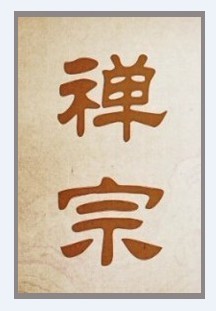 travelled around for a few years to East of China and settled at Shaolin Temple. He preached the Nature Mind Dharma that was inherited from Buddha Sakyamuni, which can be generalized as: “A direct pointing to the human mind that leads to seeing the nature and realize Buddhahood; a special transmission beyond the teaching that is not set forth in words and language ” (不立文字, 教外别傳,直指人心,見性成佛) Since then, Zen became the mainstream in Chinese Buddhism.
travelled around for a few years to East of China and settled at Shaolin Temple. He preached the Nature Mind Dharma that was inherited from Buddha Sakyamuni, which can be generalized as: “A direct pointing to the human mind that leads to seeing the nature and realize Buddhahood; a special transmission beyond the teaching that is not set forth in words and language ” (不立文字, 教外别傳,直指人心,見性成佛) Since then, Zen became the mainstream in Chinese Buddhism.
Therefore, Bodhidharma was respected as the first Patriarch of Chinese Zen Lineage, and Shaolin Temple was regarded as the ancestral temple of Chinese Zen. When Bodhidharma passed the “ Cassock and Bowl ” to Huike, the second Patriarch of Chinese Zen Lineage, he wrote a hymn of “Originally I came to this land to transmit Dharma to save the deluded beings. The flower of Sermon would further blossom with five petals and eventually would bear fruit naturally,” (吾本來慈土,傳法救迷情,一花開五葉,結果自然成。) It implicated that the orthodox Dharma will be separated into five parts after the fifth Patriarch of Chinese Zen lineage, Hongren, and the rule of inheritance will be changed into secret.
* History of Caodong & Sangha Dharma :
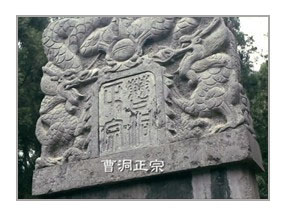 After Hongren, the Zen lineage was split into two main parts: the Northern was led by Shenxiu and was associated with the teaching of Gradual Enlightenment, and the Southern part was led by Huineng was associated with the teaching of Sudden Enlightenment. The orthodox dharma was eventually divided since then as well.
After Hongren, the Zen lineage was split into two main parts: the Northern was led by Shenxiu and was associated with the teaching of Gradual Enlightenment, and the Southern part was led by Huineng was associated with the teaching of Sudden Enlightenment. The orthodox dharma was eventually divided since then as well.
Afterwards, the Gradual Practice and Sudden Enlightenment(漸修和頓悟)paths were finally reunified until preaching of the “foremost truth” by Qing Yuan Xingsi and his followers of Zen Master Benji, as well as the foundation of Caodong Dharma as well as the spreading of the doctrine of “ Five Positions of Monarch and Ministries”. (五位君臣)
During the Yuan Dynasty, Zen Master Fulu respected Caodong Master Wan Song Xingxiu as his guru. Afterwards, he became the abbot of Shaolin temple, thus ensuring that Caodong Dharma was widely practiced into that temple. In order to assured the precise uniqueness of lineage, Zen Master Fulu established the Sangha Dharma and concluded a 70-character Rhyme of Genealogy for the orthodox Caodong sec of Shaolin temple.


